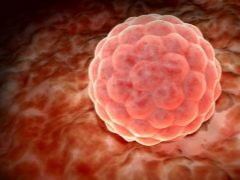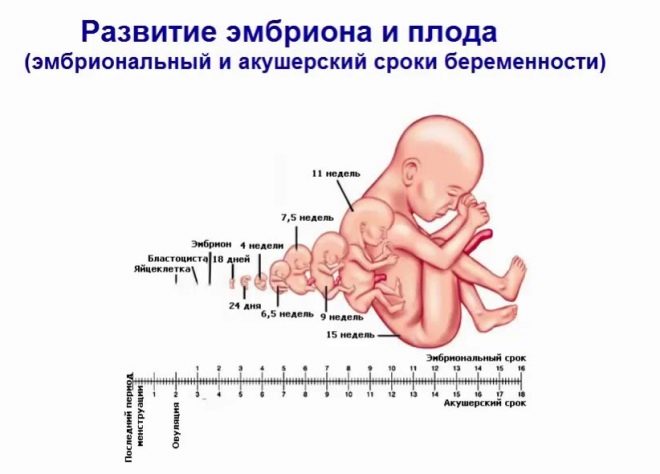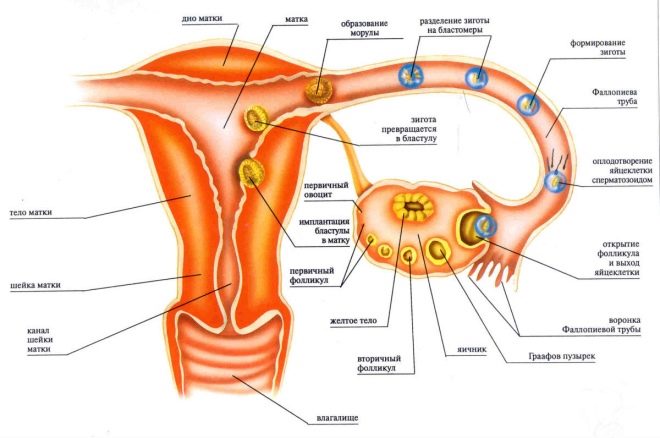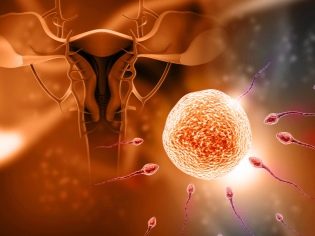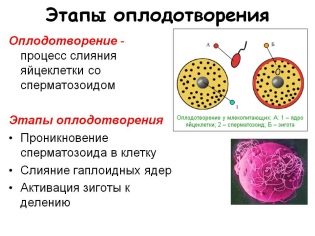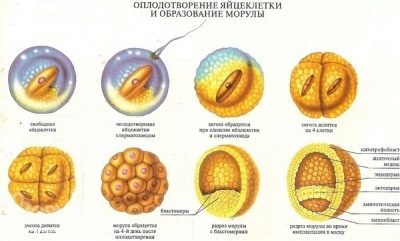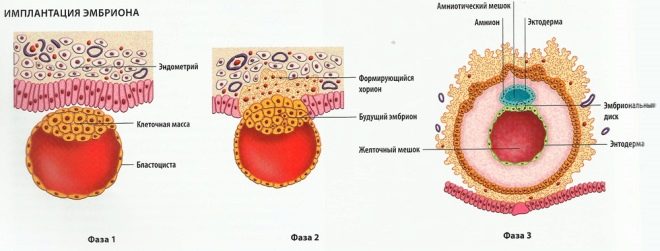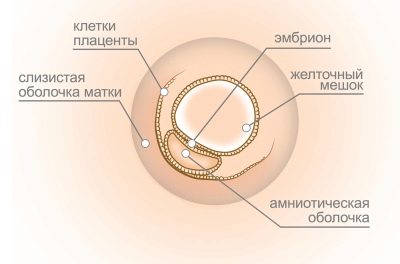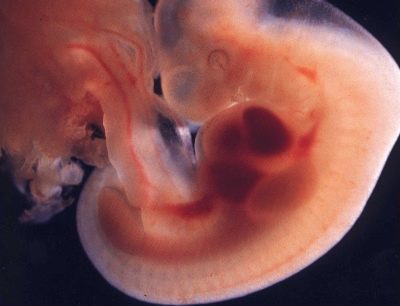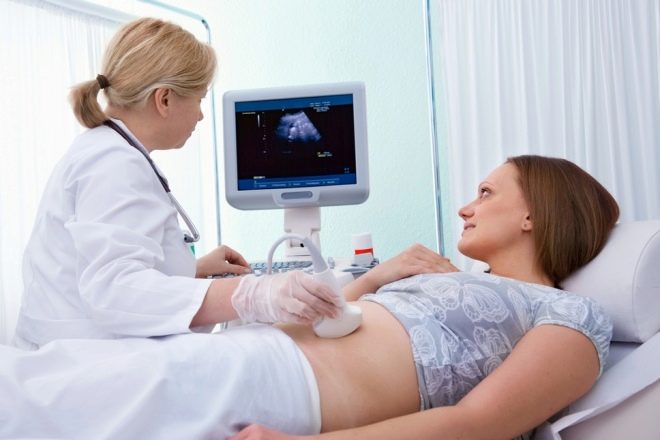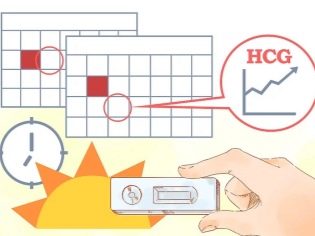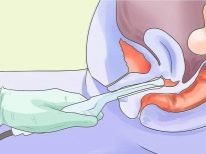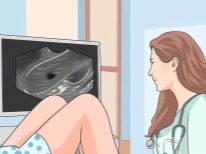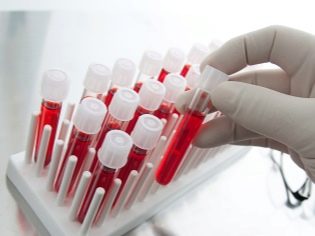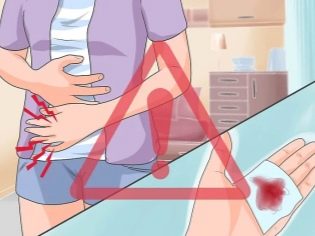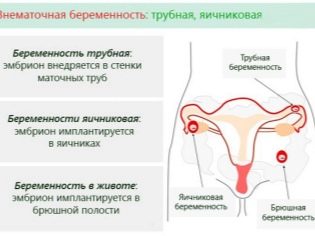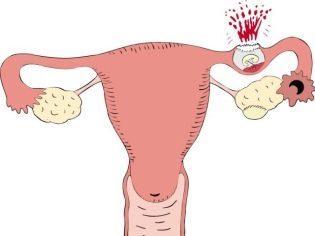3 week of pregnancy: what happens to the embryo and the expectant mother?
At 3 weeks of pregnancy, most women still do not even know about their "interesting position." The fate of the child is also covered with a veil of secrecy. If conception took place, it remains to be seen whether implantationwhether the new life in the female body will develop further. What happens to the embryo and the expectant mother at this time, we will tell in this material.
What is the term?
3 weeks of pregnancy in the understanding of an ordinary person and a gynecologist are completely different terms. Doctors calculate the period of carrying a baby from the first day of the last menstruation. Thus, 3 obstetric weeks of pregnancy is 1 week after conception or the first week after ovulation. Depending on the timing of the onset of ovulation, the most important event occurs most often on the third week - the conception itself.
In the understanding of the masses, the third week of pregnancy is three weeks after the intended conception, this is already an important period in which the majority of women learn that a new life is developing inside. The first 3 weeks are very important for the embryo.
If we talk about the 3 weeks that have passed since the time of the delay, then this is already the 5th embryonic week of pregnancy or 7 obstetric. At this time, there can be no doubt, many pregnant women during this period come to the antenatal clinic to get on the dispensary account and start testing.
Speaking about the third week of pregnancy, you should clearly define what we mean:
- the third week by the standards of doctors;
- the third week is estimated by a woman who supposedly or accurately knows the day of possible conception;
- three weeks delay.
Since the last point, as we found out, is associated with completely different periods of pregnancy, we will describe in more detail about week 3 in the understanding of obstetricians and in the future mother’s understanding.
How does the embryo develop?
What happens to the baby and mother this week of pregnancy depends on what week is meant.
Obstetrician
If there is a third obstetric week, then the woman has just ovulated, or it will happen from day to day. The mature egg leaves the follicle, and on the same day or a day later, while it retains the ability to fertilize, an encounter with the sperm cell occurs. If the third obstetric week has just begun, then fertilization can happen or has happened. If the third week ends, then the probability that fertilization has already taken place is higher.
Conception occurs in the enlarged part of the fallopian tube, located closest to the ovaries. It was there that the ovum released from the follicle waits for a significant meeting with the male reproductive cell. Only a small number of spermatozoa reaches this part of the female body - most die in the acid environment of the vagina. Thus, only the most hardy and mobile can reach the goal.
The sperm head has a cavity filled with enzymes. They are needed to dissolve the dense double shell of the egg and get inside.Its male cells are dissolved together, since the impact of only one sperm will not be enough. But only one gets inside - the one that can overcome the shell first.
It is rare, but it is also possible that two or more spermatozoa will penetrate into the egg. In this case, the embryo develops with gross chromosomal triploid disorders. Such an embryo is doomed to death - either within a few days or at an early period after implantation. He is not viable.
Erroneously, some believe that identical twins are born from two sperm. Twins appear when two eggs are fertilized or zygotes are broken up at the crushing stage into two or more parts.
A multicellular organism gradually begins to form from the egg. The first 1.5 days inside the woman is no longer the egg cell, but the zygote is the initial single-cell stage of embryo development.
In the next three days of the third obstetric week of pregnancy, surprising processes take place with the woman's body - the zygote begins to break up, new blastomeres are formed. At the same time, it moves along the tube closer to the uterus. The movement provides contraction of the muscular layer, which the woman cannot feel in any way, and fluctuations of small, but very mobile hairs inside the tube.
On the fifth day after fertilization, towards the end of the third week in obstetric terms, the zygote becomes a blastocyst. This is a ball consisting of about 30 cells. On the sixth day of the blastocyst enters the uterus, its division continues. Under the action of the hormone progesterone, the endometrium of the main female reproductive organ has already been prepared.
At the next obstetric week - the fourth - implantation of the blastocyst, held on the uterine wall. This usually occurs on days 7-8 after conception. But the implantation may be earlier, and then it will mark the end of the third obstetric week.
If ovulation with a 28-day cycle occurred exactly on time - on the 14th day, then exactly in 3 obstetric weeks the baby attaches to the wall of the uterus, where it is to develop within nine months. If fertilization did not occur, if the blastocyst could not be fixed and the mother's body "rejected" it, then after a week the woman begins her planned periods.
Fetal
Three weeks of embryo development is the fifth obstetric week. After the delay, it took only a week, and many women, especially those with an irregular cycle, still do not know that they will soon become mothers, although, most likely, they already have thoughts about such a probability.
The embryo develops by leaps and bounds. This week he has a respiratory system, digestive organs, and urination. They are still being laid at the cellular level, but this process is proceeding at a very fast pace.
In size, the embryo barely falls short of the size of the sesame seeds. Its length is no more than 4 mm, and its weight is about 3 grams.
This week, the baby first declares its rights to independence and is separated from other embryonic structures, which include chorion, amnion and yolk sac. This week, the baby finally “determined” with sexual identification.
Gender is predetermined from the moment of conception, but only three weeks later, primary germ cells begin to form: in boys, in the male type, and in girls, in the female. These prototypes of future oocytes and sperm produce a yolk sac.
In the fifth week, pussy acquires a chord, which then becomes the spine. On both sides of the notochord budding begins. The embryo itself now looks very strange. The front part of it will soon become a head, and the back, more thin - legs. In the meantime, it looks like a comma. But in the central part of it the heart muscle is actively developing.
On a good high-resolution ultrasound scanner, an experienced diagnostician will already be able to notice a small pulsation - this is a kind of heartbeat, the first unconditional sign of a baby’s life.
The formation of the nervous system begins - at this time the neural tube closes. That she later become the spinal cord. Symmetrical outgrowths are formed along the neural tube - then these will be the muscles of the back.
What does mom feel?
Feelings of a woman also depend on the exact term that is implied when they talk about the third week.
Obstetrician
Nothing out of the ordinary at this time happens to a woman. Some people claim that they are able to feel ovulation - due to short-term light pulling or tingling pain from the right or left - depending on which side of the follicle breaks.
Allocation during the period of ovulation and a couple of days before it becomes viscous, mucous, their total number increases, the woman feels increased humidity in the perineum. At the same time, nature has provided an increase in libido - sexual appetite begins to rise.
Feeling conception is physically impossible. In any case, this opinion was unanimously reached by physicians and scientists. But some women claim that on a subconscious level, quite inexplicably, they understood just a few hours after intercourse that something important had happened.
The woman’s well-being does not change in the first days after conception, while the zygote and then the blastocyst move into the uterine cavity. The first unusual symptoms may (but not necessarily) appear only at the time of implantation, which occurs at the end of 3 weeks or at 4 weeks.
A woman may experience small pulling sensations in the lower abdomen, sometimes there is a so-called implant bleeding - on a daily lining or underwear a woman may notice a small speck of blood, discharge with a dichorus. Some people regard this as prematurely beginning periods.
Implant bleeding is one-time in nature, the very next day the woman does not have any abnormal discharge. Not everyone and not always implantation proceeds in this way, in most cases nothing happens on the physical level, and the woman remains in the dark.
Physical changes in the future mother's body begin from the moment of implantation, when the level of hCG begins to rise - a hormone that is produced by chorion shells.
Under the action of hCG and progesterone, which also takes part in ensuring the survival of a small and still very fragile life inside a woman, the body temperature can rise slightly in the evenings (up to 37.0 degrees or slightly higher), mild symptoms of indisposition, chills can occur. In the mornings, these signs, as a rule, disappear without a trace. A woman may decide that she has a cold.
Progesterone, among other things, suppresses maternal immunity, so that it does not “deal” with the embryo as an alien invader, can really become the “culprit” of the onset of the disease. Immunity weakens, and thus it becomes easier for a woman to get sick. But the true diseases in this period are not so often. In most cases, what is taken for a cold is the reaction of the female body to the hormonal attack inside.
Some women note that on the third obstetric week their breasts tingle, the mammary glands increase slightly. However, this phenomenon is peculiar to the ordinary, “non-pregnant” second phase of the menstrual cycle. If the conception did not take place or the blastocyst failed to consolidate, then the monthly will come on time or be a little late.
A woman a couple of days before they notice that her chest has stopped hurting. The hormonal background will change, progesterone will no longer be produced in large quantities, and this will immediately affect the general well-being and sensations in the mammary glands.
Fetal
In the third week of embryonic development, the sensations are purely individual. Some flit and feel great, while others have already begun all the "charms" of early toxicosis. The mood of a woman changes, even if she is not yet sure of the fact of pregnancy. Ladies are becoming more sentimental, sensitive, whiny. The mood can change during the day several times for no apparent reason. This is how progesterone, produced in large quantities, manifests itself.
Its main task is to provide the embryo with normal development, and an elevated body temperature, an incredibly strong desire to eat almost constantly, a change in the perception of smells and tastes are side effects of a major hormonal adjustment within the female body, which is provoked by progesterone.
At the fifth obstetric (third embryonic) week, the woman feels increased drowsiness and gets tired quickly, this is also due to the intensive processes that occur in the body - they require a large amount of energy.
The mammary glands are enlarged. The breast grows about the size due to the proliferation of glandular tissue under the influence of female sex hormones. So the breast is preparing for feeding the baby. Many future mothers complain of pain, a feeling of fullness in the chest, tingling and itching in the nipple area.
Nausea, vomiting, and loose stools may appear precisely at this time; they speak of the onset of toxicosis. He does not "start" at all. There may be brown discharge, daub. However, sometimes strongly pulls the lower back.
Such signs do not bode well, most often they are evidence of the threat of termination of pregnancy - a woman needs a mandatory medical consultation. The possibilities of modern medicine make it possible to save pregnancy in most cases.
After IVF, the third embryonic week is unremarkable if there is one fetus in the uterus. If there are two or even three babies, then the sensations of a woman can be more pronounced.
How to diagnose pregnancy?
This is the main question that is relevant for 3 weeks both in her medical understanding and in the development of the baby. We will try to answer it.
Obstetrician
Find out whether the conception took place at 3 weeks by obstetric standards, it is impossible. Neither an experienced doctor, nor the most sensitive test in the world, nor a blood test, nor ultrasound will be able to show processes that are safely hidden from prying eyes - the mystery of the birth of a new person. Even if a woman underwent in vitro fertilization, then in the first days after it, none of the existing diagnostic methods in medicine can answer the main question - whether embryos have taken root.
You need to be patient and wait another week. At the end of the 4th obstetric week, you can take a blood test for hCG. In non-pregnant women, the level of this gonadotropic hormone is from 0 to 5 units. After implantation of the blastocyst, the hormone begins to secrete and increases approximately twice every two days. Simple calculations show that it will be able to overcome the level of 5 units in pregnancy level 2-4 days after implantation.
Thus, a blood test can theoretically show pregnancy only at 9-10 days after conception, at 4 obstetric weeks.
However, during late ovulation and on these days, laboratory technicians will not be able to establish the fact of the conception held. We'll have to wait until 12-14 days after the expected date of ovulation (in the middle of the cycle).
Express tests from a pharmacy, even the most sensitive and modern, for example, electronic, are less informative than a blood test from a vein on hCG. This is because the hormone enters the urine from the blood, respectively, its amount in the blood is always higher than in the fluid excreted by the kidneys.
In the third week of obstetric calculus, it is definitely early to do tests.A reliable result can be obtained only on the first day of the delay and later, that is, at 4-5 obstetric week.
Many women begin to “soak” the test strips almost 3-4 days after conception. It makes no sense. The concentration of the hormone in the urine, which is necessary for the second band in the test zone to stain, must be at least 20-25 IU / ml.
Tests with high sensitivity may show a weak second strip before the delay, which will become brighter as the hCG level increases (approximately every two days).
Fetal
There is the fifth obstetric week, which means that the monthly periods have been delayed for a week. Usually women are already aware of their situation, because the test has already shown the second strip, blood tests confirmed that there is a pregnancy and it is developing. If a woman is still waiting for the onset of menstruation, but they are not there, it's time to choose one of the methods of diagnosis, be examined and find out the truth.
Some at this time apply to the antenatal clinic to register. And some, especially curious, run to record for ultrasound, to dispel all doubts. At 3 embryonic week, the fact of pregnancy can be confirmed by ultrasound, if, of course, the diagnosis is not carried out on an old device, the resolution of which is not high.
The doctor will show the future mother on the monitor a black dot - the fetal egg and measure its diameter. While this is the only size that allows you to judge the compliance of the gestational age with the norms, make sure that the baby is growing.
Analyzes and surveys
At the third obstetric week, no analysis is required for the average woman. The exceptions are couples who are trying to get pregnant through modern assisted reproductive techniques, such as IVF. So women this week will be egg sampling. It will be fertilized outside the maternal organism and then transferred back to the uterus on the third or fifth day.
At the third embryonic week, special examinations are also not required if the woman is not in a hurry to register. If she did, then she will be given a fairly substantial list of tests to be performed. This includes general blood tests, urine tests, advanced biochemical blood tests, tests for all infectious diseases, for HIV, and syphilis.
A woman will be taken on a swab of vaginal secretions for analysis to establish the composition and balance of microflora. Ultrasound examination (ultrasound) will be done according to indications - after IVF, after intrauterine insemination, if there are signs of a threat of miscarriage.
Possible problems
Problems and various complications can accompany the third week of pregnancy, by whatever method it may be calculated.
Obstetrician
The main problem at conception is the absence of conception itself. The ovum may not come out of the follicle, ovulation may not take place. Sperm cells can be weakened, morphologically altered, and then they will not be able to reach the female cell, and if they get there, the risk of a genetically unhealthy pregnancy increases. For everything to be normal, you need the simultaneous coincidence of many favorable factors.
Even if the conception took place, there is a very real risk of the embryo stopping in development. For unexplained and incomprehensible reasons, the zygote stops in fragmentation, and the blastocyst is rejected by maternal immunity. Implantation may not take place due to endometrial diseases of the woman and other inflammatory and infectious diseases of her reproductive system, as well as for reasons that remain a big mystery to science.
Sometimes there is such a fact as a biochemical pregnancy, during which implantation took place, but the development of the baby stopped after it as soon as possible. In this case, a hCG test or blood test may show a pregnancy, but menstruations still come with a slight delay. Many women do not even realize that they were pregnant.
Fetal
Pathologies of pregnancy at this time can happen quite a lot. Most often it is the appearance of symptoms of an early threat of miscarriage, the occurrence of retrochorial hematoma. A woman should be alerted and forced to turn to a doctor for symptoms such as spotting of greenish, brown, pink or orange, pulling, as during menstruation, pain.
Overwhelmingly, with timely medical care, pregnancy can be maintained.
Implantation previously could not occur in the uterus, and the tube or cervix. In this case, talking about ectopic pregnancy. At this period, it can indicate the level of hCG, which will be well below the norm for the fifth obstetric week. In the uterine cavity, an expert-class ultrasound machine cannot detect the fertilized egg.
Pregnancy is a pregnancy that has stopped developing, but miscarriage has not occurred. In this case, the fertilized egg simply stops growing, and the level of the hormone HCG gradually decreases. Both this problem and ectopic pregnancy are reasons for urgent hospitalization and emergency surgical assistance for embryo extraction.
Rarely other complications in this period such pathology as anembryony occurs. This is the complete absence of the embryo in the fetal egg. You can install it on ultrasound, further actions of the doctors do not have variability - only the removal of the ovum in the surgical way, curettage of the uterus is shown.
Recommendations
Women who are at the third obstetric week can be advised to be patient and not to rush at any cost to find out if the pregnancy has occurred. This will only lead to unnecessary stresses and experiences, namely, they are one of the most common causes of miscarriages in the early stages.
Women in the third week of conception should be attentive to their health, to prevent infection, infection with seasonal diseases - influenza, ARVI. Now the formation of organs and systems of the baby. Any negative impact of viruses and bacteria can lead to an irreversible failure in these complex and important processes, which can cause the death of the baby, congenital malformations, pathologies of internal organs.
If the beginning of pregnancy falls on the unfavorable season of the year from the point of view of epidemiology, one should avoid visiting large stores, crowded places. The doctor will be able to suggest which vitamins for pregnant women can be taken at this time in order to strengthen the immunity and give the child everything necessary for proper and harmonious development at this stage.
Sex is not prohibited if there is no threat of interruption. In the event of secretions that are not normal, intimate pleasures should be postponed until better times.
Many women are interested in whether it is possible to fly early on the plane. Unambiguous medical contraindications do not exist. However, it is better to abstain from air travel for at least 12 weeks of pregnancy for women who had a history of early miscarriages earlier, and this pregnancy again began with a diagnosis of “threatened miscarriage”.
Flights are undesirable for future mothers with severe toxicosis, a tendency to drops in blood pressure. All the rest you can fly, if you feel well.
Alcohol and nicotine can also cause miscarriage, as well as malformations of the baby. Now, in the first months, while the organs are being actively laid down, any negative factor can lead to irreversible consequences for the child. Therefore, wine and cigarettes must be completely abandoned.
Do not take any medication without the permission of the obstetrician-gynecologist. If a woman has a constant need for some medications, the possibility of their further intake should be discussed with a doctor.
In the earliest terms it is worth taking care of your diet. No need to overeat or undernourish.It is better, right from this week, to introduce fractional 5-6 meals a day in small portions, to abandon mayonnaise, sausages and sausages, chocolate and baked pastries, replacing them with fruits, vegetables, good lean meat, fish, and milk. As far as maternity leave is still far away, it is worth buying several food containers in order to carry food for each meal with you directly to work or study.
In the third embryonic week, it is important for a woman not to be in contact with toxins, sources of radioactive radiation, varnishes, paints and toxic chemicals. Therefore, if the work of the future mother is associated with harmful working conditions, you should inform the employer about the pregnancy by presenting him a certificate from the antenatal clinic. Working conditions during pregnancy should be changed without loss of payment.
For more information on what happens to the embryo and the expectant mother in the third week of pregnancy, see the following video.
